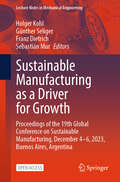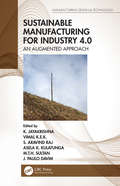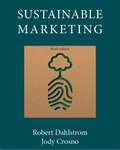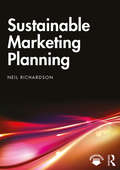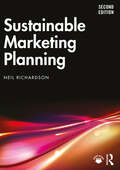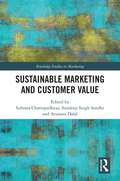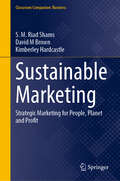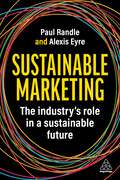- Table View
- List View
Sustainable Management of Historic Settlements in Asia: Role of Intangible Cultural Heritage (Sustainable Development Goals Series)
by Anjali Krishan Sharma Niyati JigyasuThe book addresses the contribution of Intangible Cultural Heritage to the sustainable management of historic cities and towns. Through the unique, diverse, and dynamic illustrations from Asia, it provides insights into the interrelationships of intangible and tangible cultural attributes and their significance on the sustainability of these areas. Historic cities and towns, large and small, along with their natural and man-made environments have a distinct identity and embody the values of traditional urban cultures. Evolved by tangible built forms and intangible elements, as cultural practices and expressions- meanings and values attributed to them, they are in a state of continuous change. The built environment acts as a ‘place’ or a ‘site’ where most of these expressions are shaped. These areas are significant for their social cohesion and economic stronghold that dates back over generations and centuries. Over the years, there have been many theoretical discussions about the interrelationships of tangible and intangible but is challenging to manage in practice, especially in historic urban areas. There is a lack of understanding of the complexity and pervasiveness of intangible values and their direct relationship with the physical structure of the town/city. This book strives to address the various challenges, emphasising the intricate relationships between the tangible and intangible aspects of historic cities in the Asian context.
Sustainable Management of Japanese Entrepreneurs in Pre-War Period from the Perspective of SDGs and ESG
by Masaatsu Takehara Naoya HasegawaThis book features 13 Japanese entrepreneurs who made a significant contribution to the development of society from 1868, when modernization in Japan began, to the 1950s, after World War II. They worked on solving social issues at the time through their businesses and succeeded in creating social value by solving social issues and economic value through the development of their businesses. The business philosophies they practiced have been passed on to their successors, and the companies they founded are now providing value to consumers around the world. Those 13 entrepreneurs anticipated the integration of solving social issues into corporate management, which modern companies are expected to realize under the umbrella of the Sustainable Development Goals (SDGs) adopted by United Nations in 2015. Their trajectories provide a wealth of practical knowledge necessary to survive in a changing society and provide many valuable lessons for modern companies and their managers.
Sustainable Management of Luxury
by Miguel Angel GardettiAs this book is the first book worldwide in the "sustainable" management of luxury area, it highlights key aspects in the sustainable management of luxury based on presentations using different approaches, whether reflexive, empirical, hands-on or applied theory and cases.
Sustainable Management of Manufacturing Systems in Industry 4.0 (EAI/Springer Innovations in Communication and Computing)
by Michal Balog Lucia Knapcikova Marko Perisa Dragan PerakovićThis book provides a comprehensive exchange of information on current developments in the field of sustainable management of manufacturing systems and Industry 4.0. The authors’ ambition is to establish channels of communication and disseminate knowledge among professionals working in smart manufacturing and related institutions. The book brings together world-leading academics and practitioners from the fields of engineering, infrastructure planning, manufacturing management, and economics. The unique combination of fields and disciplines focused on Industry 4.0 provides presents opportunities to create a bridge between science and practice.
Sustainable Management of Transnational Megaprojects (Routledge-Giappichelli Studies in Business and Management)
by Laura Corazza Dario Cottafava Daniel Torchia Stefania CamolettoThis book analyses the seminal role of megaprojects for sustainable development, and the related, complex challenges they bring. It provides insights into the growing social responsibilities that megaprojects have, not only to be environmentally sustainable, but also towards the multitude of stakeholders involved, whether directly or indirectly. After an historical overview of the increasingly necessary links between sustainable infrastructure and megaprojects, the book builds on and applies stakeholder theory to stakeholder engagement and management in megaprojects. It also emphasizes the importance of building impact assessment frameworks that consider the unheard voices that are often passively sitting at the receiving end of a megaproject, as well as the local context where the megaproject is embedded. The book then proceeds to analyse the case of a very contested transnational railway megaproject between Italy and France, the Turin-Lyon high-speed railway, which has been suffering from stakeholder and communication issues for over thirty years, as well as from notable managerial and legal differences in the two countries. In this way, the book informs both theory and practice and encourages scholarly interventions into wicked problems. It contains a comprehensive review of the academic literature on the sustainability, sustainability challenges, and sustainability reporting of megaprojects. Conceptual models, frameworks and future research opportunities are provided to clarify the empirical challenges and highlight the gaps and opportunities to be explored by researchers and practitioners in future. The audience for the book is both academic researchers and practitioners in the field of megaprojects and more specifically, those dealing with managing transnational megaprojects. It also includes several topics that will be of interest to policy and decision-makers.
Sustainable Management of Wastes Through Co-processing
by Sadhan Kumar Ghosh Ulhas V. Parlikar Kåre Helge KarstensenThis book is the first comprehensive book in the world on co-processing of wastes as Alternative Fuels and Raw materials (AFRs) in cement kilns. It discusses how AFR from wastes can play an important role in contributing toward reducing the use of fossil fuel and costs while conserving natural resources, lowering global CO2 emissions, and reducing the need for landfills. The use of AFR in resource and energy-intensive industries is called co-processing, which is discussed in detail highlighting both advantages and disadvantages. Co-processing in cement kilns is a technology that is practiced globally on a large scale for environmentally sound and ecologically sustaining management of wastes from agricultural, industrial, and municipal sources. Considerable amount of scientific and technological advancements has been put in place while developing and implementing this technology at the cement plant operational scales. This technology is in practice for about 40 years or so and has been recommended by Basel Convention for the sustainable management of hazardous wastes and by the Stockholm Convention for the sustainable management of POPs. This technology has now been included in the waste management rules notified by the Ministry of the Government of India and has been provided as a preferred option for the management of wastes over the conventional options of incineration and landfill. The book addresses how co-processing promotes mitigation of the climate change impacts and also conservation of the natural capital in addition to building a circular economy on a large scale.Even though this technology has received required attention and inclusion in the policy framework of many governments, its understanding and awareness with the stakeholders belonging to the academic and other relevant sections are vastly missing. The book will enhance the knowledge of co-processing technology among stakeholders involved in the implementation of the policy framework, design and engineering of the waste processing facilities to suit the co-processing operation, their operation and management, environmental consideration in implementing co-processing, operation and management of the cement plant, quality control, etc. In addition, the book will be useful for students and researchers working in this domain.
Sustainable Management: A Complete Guide for Faculty and Students (The Principles for Responsible Management Education Series)
by Petra Molthan-HillSustainable Management: A Complete Guide for Faculty and Students is both a textbook for students, as well as a teaching guide for educators. With a full introduction to sustainable management, the book covers a wide range of subject areas relevant to business and management students. It enables faculty to incorporate sustainability and climate solutions into their modules, and is also very accessible for self-directed studies. This third edition features fully updated chapters on how to integrate the Sustainable Development Goals into key disciplines in business, including economics, operations, marketing, HR, strategy, and financial reporting. We also cover topics such as corporate peacemaking, greenhouse gas management and crowdsourcing. The book offers a new chapter on how to integrate climate solutions and climate change mitigation education into business and management schools, as well as many ideas in each chapter on how to do so. The chapter on employability and sustainability was fully redesigned adding new resources, which can be used in any educational establishment. Educators in business schools and trainers in organisations will find short readymade seminars/workshops and a wide array of learning resources supported by a companion website.
Sustainable Management: Coping with the Dilemmas of Resource-Oriented Management
by Georg Müller-ChristIn the second edition of this book, the concept of resource-based sustainability has once again been expanded to include further references to modern management theories. The author shows that overcoming the dilemmas that sustainability creates for companies and all organizations leads to more complex decisions that also require higher levels of awareness. The concept of sustainable leadership is closely related to the resource approach. Finally, readers will learn how to tell a compelling transformation narrative toward sustainability.
Sustainable Manufacturing Innovations: Proceedings of ICSM 2024, Shanghai, China, October 30-November 1, 2024 (Lecture Notes in Production Engineering)
by Jürgen Fleischer Gisela Lanza Weimin Zhang Junying MinThis book provides an in-depth exploration of the latest advancements in sustainable manufacturing, as presented at the International Conference on Sustainable Manufacturing. The proceedings focus on three pivotal areas: the production of new energy vehicles (NEVs), production robots, and software-defined manufacturing. The section on NEVs delves into innovations in battery technologies, lightweight materials, eco-friendly production processes, and sustainable sourcing, highlighting how these advancements reduce environmental impact and enhance efficiency. The segment on production robots examines the integration of automation and robotics to boost productivity and sustainability, emphasizing energy-efficient systems, collaborative robots (cobots), quality control, and predictive maintenance. The final part on software-defined manufacturing explores the digital transformation of manufacturing processes, discussing digital twins, the Industrial Internet of Things (IIoT), artificial intelligence, machine learning, cloud manufacturing, and cyber-physical systems. These technologies enable smarter, more adaptive, and sustainable manufacturing environments. This comprehensive collection of research and practical applications is essential for academics, industry professionals, and policymakers committed to advancing sustainable manufacturing practices.
Sustainable Manufacturing and Remanufacturing Management: Process Planning, Optimization and Applications
by Weidong Li Sheng WangThis book reports on the latest research and applications in the fields of sustainable manufacturing and remanufacturing, as well as process planning and optimization technologies. It introduces innovative algorithms, methodologies, industrial case studies and applications.It focuses on two topics: sustainable manufacturing for machining technologies and remanufacturing of waste electronic equipment, and various methods are covered for each one, including macro process planning, dynamic scheduling, selective disassembly planning and cloud-based disassembly planning. The experimental analysis provided for every method explains the benefits, as well as how they are sustainable for various real-world applications. Further, a theoretical analysis and algorithm design is presented for each, accompanied by the contributors’ relevant research, including:• step-by-step guides; • application scenarios; • relevant literature surveys; • implementation details and case studies; and • critical reviews on the relevant technologies.This book is a valuable resource for researchers in sustainable manufacturing, remanufacturing and product lifecycle management communities, as well as practicing engineers and decision-makers in industry and all those interested in sustainable product development. It is also useful reading material for postgraduates and academics wanting to conduct relevant research, and a reference resource for manufacturing engineers developing innovative tools and methodologies.
Sustainable Manufacturing as a Driver for Growth: Proceedings of the 19th Global Conference on Sustainable Manufacturing, December 4–6, 2023, Buenos Aires, Argentina (Lecture Notes in Mechanical Engineering)
by Holger Kohl Günther Seliger Franz Dietrich Sebastián MurThis is an open access book. It gathers the proceedings of the 19th Global Conference on Sustainable Manufacturing, held on December 4-6, 2023, in Buenos Aires, Argentina. With a focus on sustainable manufacturing advances and practices as a driver for growth, the chapters selected for this book report on sustainable production technologies for the mobility, energy and construction sector, and for machines and equipment, covering aspects of digitalization and circular economy. Moreover, they discuss energy-efficient process, waste reuse, and CO2 neutral production, giving a special emphasis to developing sustainable manufacturing in Latin America. This book offers extensive and timely information for both researchers and professionals in the field of manufacturing and business development.
Sustainable Manufacturing for Industry 4.0: An Augmented Approach (Manufacturing Design and Technology)
by J. Paulo Davim K. Jayakrishna Asela K. Kulatunga S. Aravind Raj Vimal K.E.K. M.T.H. SultanIndustry 4.0 promises tremendous opportunities for industries to go green by leveraging virtual physical systems and internet driven technologies for a competitive advantage and set the platform for the factory of the future and smart manufacturing. The book provides measures that can be adopted by practicing design engineers, to develop products that will be sustainable in all stages of its life cycle. It helps organizations in implementation of sustainable manufacturing practices and formulation of critical strategies in their transition towards Industry 4.0., and the book will provide insights on ways of deploying these practices in correlation with the environmental benefits mapped to support the practicing managers and stakeholders.Features Assists in the understanding of the shifting paradigm in manufacturing sector towards smart and sustainable practices Showcases contemporary technologies and their insurgence in existing industries Focuses on need, applications, and implementation framework for Industry 4.0 Encapsulates all that one has to learn about sustainability and its transformation in Industry 4.0 Real time case studies are presented
Sustainable Marketing
by Robert Dahlstrom Jody CrosnoFormerly published by Chicago Business Press, now published by Sage Sustainable Marketing, Third Edition presents a sustainable marketing perspective that addresses financial and social performance as well as ecological performance, in consideration of the impact upon the environment in which markets operate. Authors Robert Dahlstrom and Jody L. Crosno incorporate state-of-the-art examples of business practice while delivering on a theoretically-based and managerially-relevant approach to sustainable marketing.
Sustainable Marketing
by Robert Dahlstrom Jody CrosnoFormerly published by Chicago Business Press, now published by Sage Sustainable Marketing, Third Edition presents a sustainable marketing perspective that addresses financial and social performance as well as ecological performance, in consideration of the impact upon the environment in which markets operate. Authors Robert Dahlstrom and Jody L. Crosno incorporate state-of-the-art examples of business practice while delivering on a theoretically-based and managerially-relevant approach to sustainable marketing.
Sustainable Marketing Planning
by Neil RichardsonThere are two major parallel challenges facing managers and leaders: first, how to adapt to global changes in markets, competition and supply, and second, how to grow a business while observing recognisably sustainable practices. Companies must now align their values with customers who increasingly seek people-friendly and planet-friendly products and services. Using sustainable marketing techniques to create value ultimately leads to improved customer satisfaction, better professional relationships and increased effectiveness. With marketing planning absent from the current textbook offering, this book provides practical insights, tools and frameworks to help readers produce tactically and strategically appropriate marketing plans. Showing how to embed sustainability in these strategies and reflecting on the historical and current criticisms aimed at marketing, students will be shown how to implement changes while being encouraged to reflect on why they are needed. Full of tools and frameworks to improve comprehension, including chapter-by-chapter learning outcomes, summaries, exercises, applied activities and mini case studies, it bridges the gap between theory and practice effectively and accessibly. Finally, PowerPoint lecture slides and Multiple Choice Questions sections are provided for each chapter as electronic resources. Presenting contemporary themes and challenges at the cutting edge of business research and practice, this book should be core reading for advanced undergraduate and postgraduate students of sustainable marketing, marketing planning and marketing strategy, as well as professionals seeking to improve the competitive advantage of their organisations.
Sustainable Marketing Planning
by Neil RichardsonThis book provides practical insights, tools and frameworks to help readers produce tactically and strategically appropriate marketing plans.Showing how to embed sustainability in these plans, students will be shown how to implement changes while being encouraged to reflect on why they are needed. The text reflects on contemporary themes that impact on sustainable marketing planning, including consumer behaviour, entrepreneurialism, internal marketing, services, international marketing, event management and digital marketing. The second edition has been fully updated with a greater focus on the issues surrounding sustainability, including the environmental challenges facing businesses, sustainable accreditation and integrating the UN SDGs. It provides background on the value discourses that underpin sustainability, incorporates new examples and case studies from broader regions around the world and introduces TBL-based loyalty. Full of tools and frameworks to improve comprehension, including chapter-by-chapter learning outcomes, summaries, exercises, applied activities and mini case studies, it bridges the gap between theory and practice effectively and accessibly.Presenting contemporary themes and challenges at the cutting edge of business research and practice, this book provides core reading for advanced undergraduate and postgraduate students of sustainable marketing, marketing planning and marketing strategy, as well as professionals seeking to improve the competitive advantage of their organisations.Online resources for the use of instructors include PowerPoint lecture slides and a multiple choice questions section.
Sustainable Marketing and Customer Value (Routledge Studies in Marketing)
by Subrata Chattopadhyay Sundeep Singh Sondhi Arunava DalalAnticipating that marketing will experience a strategic change in the new normal post COVID-19, this book sets out to capture interesting insights from researchers and practitioners through in-depth research on the myriad aspects of industrial transformation. It discusses the facets in which markets can be reached sustainably delivering value to people, planet and create prosperity. Sustainable Marketing and Customer Value establishes an overview and framework for major ideas that connect marketing, consumption and sustainability. It addresses dominant areas of research of sustainability from the marketing perspective, the origin of interest in sustainability, as well as the practice of deprioritising sustainability ideas in pursuit of short-term business goals. Research scholars and business students will find this book of primary relevance, but it is also written for marketing academics and professionals, especially those in large corporations.
Sustainable Marketing and the Circular Economy in Poland: Key Concepts and Strategies (Routledge Focus on Environment and Sustainability)
by Anita Proszowska Ewa Prymon-Ryś Anna Dubel Anna Kondak Aleksandra WilkSustainable Marketing and the Circular Economy in Poland outlines the specific challenges around formulating an organisation's marketing strategy in line with the circular economy (CE) framework.This book helps to solve the problem of ineffective pro-environmental programmes and marketing tools, which are currently used by enterprises to make their activities more sustainable. The authors identify key concepts and strategies of sustainable marketing to highlight the trends and development directions of marketing activities of modern enterprises. Focussing on Poland as a central case study, the book is illustrated with examples of organisations that are implementing sustainable marketing activities that are compatible with the CE model. It also presents the results of studies which examined the pro-environmental marketing efforts of small- and medium-sized enterprises, non-governmental organisations and other actors in Poland. To conclude, the authors put forward recommendations for CE network stakeholders regarding sustainable marketing management, focussing specifically on how to avoid accusations of greenwashing and other unethical organisational behaviour.This book will be of great interest to students and scholars of green marketing, sustainable business and the CE, as well as entrepreneurs and business professionals looking to formulate sustainable marketing strategies.
Sustainable Marketing of Cultural and Heritage Tourism (Routledge Critical Studies in Tourism, Business and Management)
by Deepak ChhabraCultural attractions play an important role in tourism at all levels, and attract huge numbers of tourists interested in heritage and the arts. Cultural Heritage Tourism has positive economic and social impacts but can also have negative impacts on communities and regions. This book draws together and links ideas of tourism from sustainable marketing perspectives and embeds it within a heritage management setting. Through a discussion and analysis of existing literature and practices this book aims to propose a marketing strategy framework grounded in sustainable principles that can be used to sustain and preserve the authenticity of cultural heritage for future generations, whilst appealing to the suppliers, the regulators, and the consumers. The book first explains the dynamics of cultural heritage with its authenticity underpinnings, marketing, and tourism, and proposes a strategic praxis drawn from core sustainable principles. This is followed by a pragmatic examination of the proposed framework from the shaper’s (provider’s) perspective. The material presented in this book is not merely an agglomeration of documented secondary research, but the theoretical concepts are grounded in empirical research and interactive discussions with students and the travel and tourism industry. A variety of heritage institutions across the globe are used as starting points to test the applicability of the proposed paradigm: these include museums, historic house museums, heritage hotels/resorts, festivals, and heritage merchandize. This is a timely offering to a growing and vibrant area of research; what is most pertinent is that it is a thorough and fresh take on the topic with primary research included. It will find a place in student materials for a variety of courses and it should be read by practicing academics and researchers.
Sustainable Marketing of Transformative Heritage Tourism
by Deepak ChhabraThis book proposes that sustainable marketing should be founded on a higher level of consciousness, governed by the Eastern ethical principles of dharma and karma. It suggests a socially responsible, integrated marketing strategy to boost transformational heritage tourism.The book puts forward a framework to promote and inspire transformative heritage tourism from a sustainable marketing perspective. Drawing on examples from different parts of the world such as Thailand, China, the USA, India, Australia, the United Kingdom, Spain, and Hong Kong, it takes a unique approach by integrating elements associated with distributive justice, procedural justice, morally motivated existentialist authentic experiences and the well-being of visited and visiting environments. The book pivots on the planning and marketing of heritage of communities such as local, descendent and indigenous across eight broad themes: (1) promotion and sustainable branding of heritage tourism; (2) empowerment of indigenous communities; (3) authenticity and conservation of heritage; (4) safeguarding of art, culture and cultural landscapes; (5) economic viability for the host communities; (6) interpretation and resolution of dissonant heritage representations; (7) stimulating audience engagement and co-created mindful spaces and; (8) facilitating moral consciousness and stimulating lasting inner transformation in guests and hosts. Scholars can replicate and/or test the proposed guided sustainable marketing model, referred to as the transformative heritage tourism pathway, which is adapted from a) the needs, activities and well-being sequential path of transformation and, b) the socially responsible sustainable marketing doctrine guided by the principles of 'dharma' and 'karma'. This book is unique as it stresses eudaimonia as the ultimate goal of well-being and argues that its pursuit can steer the sustained transformation route toward a higher sense of consciousness and responsible production and consumption of heritage resources.In summary, this book contributes toward advancing the dialogue on sustainable marketing and transformative heritage tourism. It will appeal to researchers, undergraduates and practitioners interested in sustainable marketing, transformative heritage tourism and social, ecological, cultural and economic welfare of visited and visiting destinations.
Sustainable Marketing: A Holistic Approach
by Mark PetersonBuilding on the idea that holistic marketing strategies allow firms to assess risk and realise opportunities, this book draws on new research and industry examples to help you recognize effective sustainability practices that benefit companies, stakeholders and society. With an issue-based approach that dissects the interplay between marketing and society, the author encourages readers to critically engage with the changing nature of markets; how companies can adapt to sustainability guidelines and environmental threats while still remaining profitable in today’s global market. Using a range of examples including Costco, Juul, Facebook, Patagonia and Bitcoin, Peterson highlights the importance of social issues facing businesses today such as poverty alleviation, the drive towards more ‘green’ living, corporate social responsibility within firms and political pressures such as emissions guidelines and reducing the global carbon footprint. The Mavericks Who Made It feature also highlights key entrepreneurs throughout history, their key successes and their impact on sustainable marketing.
Sustainable Marketing: A Holistic Approach
by Mark PetersonBuilding on the idea that holistic marketing strategies allow firms to assess risk and realise opportunities, this book draws on new research and industry examples to help you recognize effective sustainability practices that benefit companies, stakeholders and society. With an issue-based approach that dissects the interplay between marketing and society, the author encourages readers to critically engage with the changing nature of markets; how companies can adapt to sustainability guidelines and environmental threats while still remaining profitable in today’s global market. Using a range of examples including Costco, Juul, Facebook, Patagonia and Bitcoin, Peterson highlights the importance of social issues facing businesses today such as poverty alleviation, the drive towards more ‘green’ living, corporate social responsibility within firms and political pressures such as emissions guidelines and reducing the global carbon footprint. The Mavericks Who Made It feature also highlights key entrepreneurs throughout history, their key successes and their impact on sustainable marketing.
Sustainable Marketing: Strategic Marketing for People, Planet and Profit (Classroom Companion: Business)
by S. M. Shams David M Brown Kimberley HardcastleThis core textbook empowers and inspires students with sustainable marketing strategies to pursue the triple bottom line; People, Planet and Profit. The purpose is to underpin a brand’s commercial competitive advantage through its societal and environmental impact. It presents complex cross-disciplinary and cross-functional theoretical and practical discussions in a simplified manner to specify how the learning outcomes from different chapters can address the grand challenges associated with climate change, economic instability, geopolitical uncertainty, and inequity whilst underpinning profit-making ventures responsibly. The authors also demonstrate how the learning outcomes from this book can be applied in pursuit of each of the 17 United Nations (UN) Sustainable Development Goals (SDGs). Each chapter features a chapter summary, preliminary vignette, key terms, web exercises, review and discussion questions, and a practice quiz. Throughout the text there are also specific teaching features to provide students and instructors with an enhanced pedagogical experience. These features include: The Manager’s Corner: These sections provide real-world examples that instructors may highlight to exemplify theory or as mini cases for discussion Sustainable Marketing in Action: These sections inspire students to apply concepts and theories to actual business situations This core textbook prepares the next generation of sustainable marketers to pursue their career goals with a commitment to fostering a positive and sustainable impact on society, the environment, the economy, their organizations, and themselves.
Sustainable Marketing: The Industry’s Role in a Sustainable Future
by Paul Randle Alexis EyreBecoming a sustainable marketer is no longer an optional extra. Sustainability has become a necessity for the future, but do you feel confident delivering on this for your clients and customers?Sustainable Marketing is a blueprint for embedding sustainability at the heart of marketing. Exposing the disturbing reality of marketing's current relationship with many of our environmental and societal problems, it challenges the traditional role of marketing, its cultural norms and gross inefficiency. It goes on to present a compelling vision for change and a practical guide for marketing professionals, equipping them with the mindset and tools to transform their daily work and the industry as a whole, into a force for good.This is the perfect guide for marketing and sustainability professionals working through their company's sustainable transformation whilst trying to avoid the pitfalls of greenwashing and carbon myopia. Written by experts who apply their unique framework to the issue, this book takes what may feel like an insurmountable challenge and breaks it down, giving in-depth advice and providing real-world success stories from companies of all sizes including Tony's Chocolonely, The Onlii and AkzoNobel.
Sustainable Markets for Sustainable Business: A Global Perspective for Business and Financial Markets (Finance, Governance and Sustainability)
by Güler ArasAround the world the focus is on the relationship between ethics and governance codes and how widely this should be interpreted. Sustainability has three main accepted dimensions: economic growth, social responsibility, and environmental protection. It is a truly multidimensional and multidisciplinary concept, and one which directly affects the risks and opportunities for markets and businesses. In three distinct parts, Sustainable Markets for Sustainable Business explores the relationship between markets and business and sustainable development, as well as issues such as climate change, pollution, land degradation and biodiversity loss. Firstly the authors, all experts from around the world, consider a variety of theoretical issues concerned with sustainability in the new environment. In Part Two the emphasis is on looking at these issues in the market and business practice under various guises. Although every chapter contains discussion and recommended solutions, the final part specifically focuses on future perspectives and the solution strategies for implementation of sustainability measures. Throughout the book the authors address the need for business and market sustainability reforms. The world's markets have the potential to improve the lives of billions in developing countries, reducing poverty and securing environmental quality for future generations. Often they fail to capture the full value of natural resources or promote the interests of poor people. Therefore, an effective public policy framework is required. Sustainable Markets for Sustainable Business and future titles in the Finance, Governance and Sustainability Series address this need.










